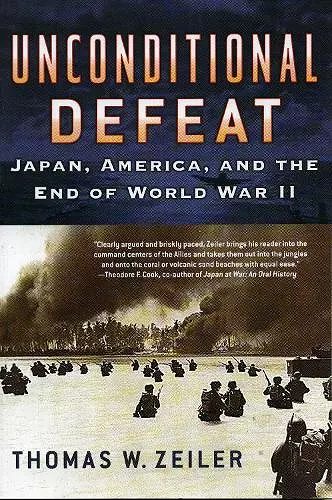Unconditional Defeat
Japan, America, and the End of World War II
Format:Paperback
Publisher:Scholarly Resources Inc.,U.S.
Published:1st Oct '03
Currently unavailable, and unfortunately no date known when it will be back

Unconditional Defeat-the second book in a Pacific War trilogy that is part of SR Books' Total War series-examines the concluding stages of World War II in Asia and the Pacific, from November 1943 until September 1945. Thomas W. Zeiler argues that this 'war without mercy' could only come to one conclusion: the complete, unconditional defeat of Japan by a mobilized, overwhelming, vengeful United States. Zeiler describes these final 22 months of the Pacific War as a story of contrasts. While the U.S. launched a methodical, smothering attack with all the means at its disposal, Japan fought a fierce yet hopeless defense with diminishing supplies. By November 1943, Japan lacked the necessities not just for victory, as in the earlier phases of the war, but for adequate defense. The Japanese had no options. The strategic planning rested with the Americans. Zeiler's gripping and thorough overview discusses other contrasts between the two foes. The Americans planned multiple advances in the Pacific Ocean and on the Asian mainland. They used a massive number of troops, devised and adopted new amphibious techniques, and deployed the new nuclear category of weapons. The Japanese stubbornly but desperately clung to their territory, often with the basest of defenses. By August 1945, the United States' forces at sea, on land, and in the air had brought Japan near complete defeat. In addition, the Japanese Empire was diplomatically isolated. Japanese politics was in turmoil, the government faced rebellion, and the Emperor stood on the brink of extinction. Wracked by the destruction of the homeland from the air and blockade by sea, Japanese society veered near chaos and the people peered into the abyss of an uncertain future. In the meantime, America's military had experienced such horrors at the hands of Japan that the U.S. made the difficult decision to unleash the atomic bomb. Despite the stark differences between the U.S. and Japan, argues Zeiler, there was one aspect of the war that both sides held in common: basic savagery. Those who were in combat witnessed the sheer hell of war. The human disaster is a tragic yet essential element to this story, and Zeiler recounts the brutality and suffering experienced by those who fought and lived through the conflict.
This brief but comprehensive history of the Pacific War's last two years is written in a style that should please both general readers and undergraduates studying military history. * Journal of Military History *
Thomas Zeiler successfully re-creates the fury of the Pacific War and shows us the ferocity, brutality, and fanaticism—of both sides—that was the reality of the Pacific War. -- Mark P. Parillo, Kansas State University
At last, a worthy historian has taken on the task of examining the issue of unconditional surrender in the Pacific Theater from the perspective of those actually waging that conflict. In clear and decisive prose, Thomas W. Zeiler looks at the Pacific War's last eighteen months and presents the strategic controversy and the personal tragedy that have too often been subsumed in less nuanced interpretations of America's march to final victory. This book should find its way onto the reading list of any serious student of the strategy and the experiences of that era. In a fast-moving narrative that still manages to put the events in context, Zeiler demonstrates the consequences of the Allied decision to push for a final and complete victory over Japan in what he sees as Japan's inability to act decisively to avoid 'unconditional defeat.' -- Theodore F. Cook, William Paterson University of New Jersey
Excellent book for enthusiasts of World War II, military history, and Japanese history * Military History Of The West *
A concise and readable military history of the Pacific Theater of the Second World War. -- Akira Iriye, Charles Warren Research Professor of American History, Harvard University
ISBN: 9780842029919
Dimensions: 232mm x 162mm x 14mm
Weight: 363g
223 pages